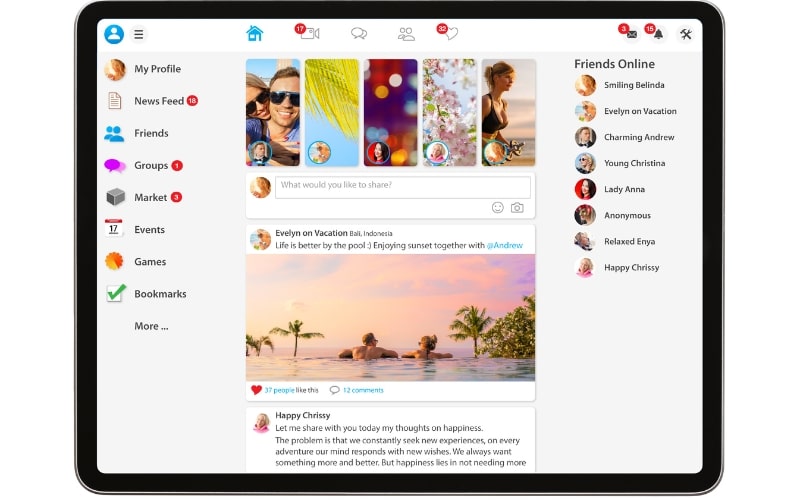- 1. The Prevalence of Social Media Screening in Recruitment
- 2. What Recruiters Look for on Social Media
- 3. The Legal and Ethical Considerations of Social Media Screening
- 4. The Impact of Social Media Presence on Hiring Decisions
- 5. Tips for Job Seekers: Managing Your Social Media Profile
- Conclusion - Are Employers and Recruiters Checking Social Media
In the digital age, social media has become a critical tool for both personal and professional networking. Are Employers and Recruiters Checking Social Media? As job seekers increasingly turn to platforms like LinkedIn, Facebook, Twitter, and Instagram to build their personal brands and connect with industry peers, employers and recruiters have also adapted by incorporating social media screening into their hiring processes.
This practice allows recruiters to gain deeper insights into candidates beyond their resumes, helping them make more informed decisions. However, this trend brings with it a host of legal and ethical considerations, making it essential for both recruiters and job seekers to navigate the social media landscape wisely. This article explores the prevalence of social media screening, what recruiters look for, the legal and ethical implications, the impact on hiring decisions, and practical tips for job seekers to manage their online profiles effectively
1. The Prevalence of Social Media Screening in Recruitment

In today’s digitally connected world, social media has become an integral part of our lives. It’s not just a platform for sharing personal updates and connecting with friends; it has also evolved into a valuable resource for employers and recruiters. The prevalence of social media screening in recruitment has grown significantly, transforming how hiring decisions are made and influencing the overall recruitment process.
Social Media as a Recruitment Tool
Employers and recruiters are increasingly turning to social media platforms such as LinkedIn, Facebook, Twitter, and Instagram to screen potential candidates. According to a 2020 survey by CareerBuilder, 70% of employers use social networking sites to research job candidates during the hiring process, and about 43% of employers use social media to check on current employees. This trend highlights the importance of maintaining a professional online presence, as it can directly impact employment opportunities.
Why Recruiters Check Social Media
Recruiters use social media for several reasons. First, it provides a more comprehensive view of a candidate beyond what is presented in their resume and cover letter. Social media profiles can offer insights into a candidate’s personality, interests, and cultural fit within the organization. For instance, a LinkedIn profile might reveal endorsements and recommendations from colleagues, showcasing a candidate’s professional reputation and skills.
Second, social media can help verify the information provided by candidates. Discrepancies between a resume and a LinkedIn profile can raise red flags, leading recruiters to question the candidate’s honesty and reliability. Additionally, social media activity can highlight a candidate’s engagement with their industry, such as participating in relevant groups, sharing industry news, or publishing thought leadership articles.
The Influence of Social Media on Hiring Decisions
The influence of social media on hiring decisions cannot be understated. According to the same CareerBuilder survey, 57% of employers have found content on social media that caused them not to hire a candidate. Common red flags include provocative or inappropriate photos, videos, or information, discriminatory comments related to race, gender, or religion, and evidence of drug use or excessive drinking.
Conversely, a positive social media presence can enhance a candidate’s chances of securing a job. Employers have reported that professional and engaging content on social media, such as a well-crafted LinkedIn profile or thoughtful tweets about industry trends, can make a candidate more attractive. A strong online presence demonstrates that the candidate is up-to-date with industry developments and is actively involved in their professional community.
Legal and Ethical Considerations
While social media screening can be beneficial, it also raises legal and ethical concerns. Employers must navigate privacy issues and avoid discrimination based on protected characteristics. It is crucial for recruiters to have clear policies and guidelines in place to ensure that social media checks are conducted fairly and consistently. Ethical considerations also come into play, as the boundaries between personal and professional life can be blurred on social media.
2. What Recruiters Look for on Social Media

Recruiters increasingly turn to social media platforms to gain deeper insights into candidates beyond their resumes and cover letters. The information available on platforms like LinkedIn, Facebook, Twitter, and Instagram can reveal various aspects of a candidate’s professional and personal life, which might not be evident from traditional application materials. Here are the key factors and attributes that recruiters typically evaluate when they look at social media profiles.
Professionalism and Work Ethic
One of the primary attributes recruiters seek on social media is evidence of a candidate’s professionalism and work ethic. LinkedIn, in particular, serves as a professional networking site where individuals can highlight their career achievements, skills, and endorsements. Recruiters look for a well-maintained LinkedIn profile that includes a professional photo, detailed job history, and recommendations from colleagues or supervisors. These elements can indicate a candidate’s commitment to their career and their ability to maintain professional relationships.
Industry Engagement
Recruiters also look for signs of engagement within the candidate’s industry. This can include participation in professional groups, sharing or commenting on industry news, and publishing original content related to their field. A candidate who actively engages with industry-related topics on platforms like LinkedIn or Twitter demonstrates a genuine interest in their profession and a desire to stay current with industry trends. This kind of engagement can set candidates apart as proactive and knowledgeable individuals who are passionate about their work.
Communication Skills
Social media profiles provide a window into a candidate’s communication skills. Recruiters assess how candidates express themselves in written form, paying attention to grammar, tone, and clarity. Posts, comments, and even the language used in profile descriptions can give recruiters an idea of a candidate’s ability to communicate effectively and professionally. Strong communication skills are essential for most roles, and social media can provide tangible evidence of these abilities.
Cultural Fit
Evaluating a candidate’s cultural fit is another critical aspect of social media screening. Recruiters look for clues about a candidate’s personality, values, and interests to determine if they align with the company’s culture. Personal posts on platforms like Facebook and Instagram, while often more casual, can reveal important information about a candidate’s hobbies, interests, and overall lifestyle. However, it is important for recruiters to approach this aspect with caution to avoid biases and ensure a fair evaluation process.
Red Flags and Warning Signs
Recruiters also use social media to identify potential red flags that might not be apparent from a candidate’s resume. These can include inappropriate or offensive content, such as discriminatory comments, aggressive behavior, or excessive partying. Such posts can raise concerns about a candidate’s judgment, professionalism, and suitability for a role. It is essential for candidates to be mindful of their public social media activity, as recruiters increasingly consider this information in their hiring decisions.
Consistency with Application Materials
Another aspect recruiters examine is the consistency between a candidate’s social media profiles and their application materials. Discrepancies in job titles, employment dates, or educational background can be a red flag. A well-aligned social media presence with the information provided in the resume and cover letter can enhance a candidate’s credibility and trustworthiness.
3. The Legal and Ethical Considerations of Social Media Screening

As social media screening becomes a common practice in recruitment, it brings forth a host of legal and ethical considerations that employers and recruiters must navigate carefully. While social media can provide valuable insights into a candidate’s personality, professionalism, and cultural fit, the process is fraught with potential pitfalls that can lead to discrimination, invasion of privacy, and other legal issues. Here’s a closer look at the key legal and ethical considerations involved in social media screening.
Privacy Concerns
One of the primary legal concerns with social media screening is the invasion of privacy. Candidates may not expect their personal social media profiles to be scrutinized by potential employers. This expectation of privacy varies across platforms—while LinkedIn is explicitly professional, Facebook and Instagram are often used for personal sharing. Employers must be cautious not to overstep boundaries by delving too deeply into a candidate’s private life. Ensuring that social media checks are confined to publicly available information is essential to avoid privacy violations.
Discrimination and Bias
Social media profiles can reveal a wealth of personal information, including race, gender, age, religion, sexual orientation, and political affiliations. Using this information to make hiring decisions can lead to discrimination claims under various employment laws, such as Title VII of the Civil Rights Act in the United States. To mitigate the risk of discrimination, recruiters should establish clear guidelines on what type of social media information will be considered relevant and ensure that all candidates are evaluated based on the same criteria. Ideally, the person conducting the social media screening should not be involved in the final hiring decision to reduce unconscious bias.
Consistency and Fairness
Applying social media screening inconsistently can lead to claims of unfair treatment. It’s crucial for recruiters to have a standardized process for social media checks, ensuring that all candidates for a particular position undergo the same level of scrutiny. Documenting the social media screening process and the specific attributes being evaluated can help maintain consistency and fairness. Additionally, candidates should be informed that social media screening is part of the hiring process, providing transparency and allowing them to manage their online presence accordingly.
Accuracy and Reliability
Information found on social media can sometimes be misleading or inaccurate. For example, a candidate might be tagged in a post that doesn’t accurately represent their views or behavior. Relying solely on social media for critical hiring decisions can lead to false assumptions and unjust rejections. Recruiters should cross-verify any significant findings with other sources and give candidates an opportunity to explain or clarify any potentially concerning content.
Legal Compliance
Different countries have varying laws regarding social media screening. In some jurisdictions, accessing certain types of social media information without explicit consent from the candidate may be illegal. For instance, the European Union’s General Data Protection Regulation (GDPR) imposes strict requirements on processing personal data, including data obtained from social media. Employers must be aware of and comply with relevant local laws and regulations when conducting social media checks to avoid legal repercussions.
Ethical Considerations
Beyond legal compliance, ethical considerations play a significant role in social media screening. Recruiters must balance the need for thorough candidate evaluation with respect for individual privacy and autonomy. Ethical social media screening practices include avoiding the use of deceptive tactics, such as creating fake profiles to access private information, and refraining from making judgments based on irrelevant personal data. Fostering an ethical recruitment process helps build trust with candidates and enhances the company’s reputation.
4. The Impact of Social Media Presence on Hiring Decisions

In the digital age, the lines between personal and professional lives are increasingly blurred, with social media playing a significant role in shaping public perceptions. Employers and recruiters now routinely scrutinize candidates’ social media profiles to gain deeper insights into their personalities, professional demeanor, and cultural fit within the organization. The impact of a candidate’s social media presence on hiring decisions is substantial, often influencing whether they advance in the hiring process or are dismissed from consideration. Here’s an in-depth look at how social media presence affects hiring decisions.
Positive Indicators on Social Media
A well-maintained social media presence can significantly enhance a candidate’s appeal. LinkedIn, for instance, serves as an online resume, where candidates can highlight their professional achievements, skills, and endorsements from colleagues. A robust LinkedIn profile, complete with a professional photo, detailed job descriptions, and genuine recommendations, can showcase a candidate’s expertise and reliability.
Active engagement on platforms like LinkedIn or Twitter, where a candidate shares industry-relevant content, participates in professional discussions, and demonstrates thought leadership, can further bolster their professional image. Such activities indicate a proactive approach to personal development and a genuine interest in their field, making them attractive to potential employers.
Moreover, social media can provide evidence of a candidate’s soft skills, such as communication, creativity, and interpersonal abilities. Positive interactions, respectful debates, and insightful contributions to discussions can highlight these qualities, painting the candidate in a favorable light.
Red Flags and Negative Impacts
Conversely, a candidate’s social media presence can also reveal red flags that might disqualify them from consideration. Employers often look out for inappropriate content, such as offensive language, discriminatory remarks, or unprofessional behavior. Posts depicting excessive partying, substance abuse, or any form of illegal activity are particularly detrimental, raising concerns about the candidate’s judgment, reliability, and suitability for a professional environment.
Inconsistencies between a candidate’s resume and their social media profiles can also be problematic. Discrepancies in employment dates, job titles, or qualifications can lead to doubts about the candidate’s honesty and integrity. Recruiters are likely to cross-check information on LinkedIn with the resume to ensure accuracy and authenticity.
Additionally, negative interactions on social media, such as public arguments, hostile comments, or a general lack of professionalism, can harm a candidate’s chances. These behaviors can suggest poor conflict resolution skills and an inability to maintain composure in stressful situations, qualities that are undesirable in most professional settings.
The Role of Privacy Settings
Candidates should be mindful of their privacy settings on social media. While maintaining a professional presence on platforms like LinkedIn is beneficial, they might want to restrict access to more personal content on platforms like Facebook or Instagram. Ensuring that only trusted contacts can view personal photos and posts helps mitigate the risk of unprofessional content affecting their job prospects.
The Ethical Considerations for Employers
Employers must navigate social media screening with ethical considerations in mind. It is essential to respect candidates’ privacy and avoid discriminatory practices based on information gleaned from social media. Recruiters should focus on professional and relevant content, ensuring that the screening process is fair and consistent for all candidates. Establishing clear guidelines and communicating these to candidates can foster transparency and trust.
5. Tips for Job Seekers: Managing Your Social Media Profile

In today’s digital era, a job seeker’s social media presence can significantly impact their chances of securing employment. Employers and recruiters frequently review candidates’ social media profiles to gain insights into their personality, professionalism, and cultural fit. Therefore, managing your social media profile effectively is crucial to making a positive impression. Here are some tips to help job seekers optimize their social media presence.
Audit Your Current Social Media Profiles
The first step in managing your social media presence is conducting a thorough audit of your existing profiles. Review your accounts on platforms like LinkedIn, Facebook, Twitter, and Instagram to ensure that the content aligns with the professional image you want to project. Delete or hide any posts, photos, or comments that could be viewed as inappropriate or unprofessional. Look for inconsistencies between your resume and your social media profiles, such as job titles or employment dates, and update them to reflect accurate information.
Enhance Your LinkedIn Profile
LinkedIn is the go-to platform for professional networking and job searching, making it essential to maintain a polished and comprehensive profile. Ensure that your profile photo is professional, your headline clearly states your job title or career aspirations, and your summary effectively highlights your skills, experiences, and achievements. Include detailed descriptions of your previous roles, focusing on your accomplishments and contributions. Solicit recommendations from colleagues or supervisors to add credibility to your profile. Regularly engage with industry-related content, join relevant groups, and connect with professionals in your field to demonstrate your active involvement in your industry.
Maintain Professionalism Across All Platforms
While LinkedIn is the primary platform for professional networking, it’s important to maintain a level of professionalism across all your social media accounts. Employers may look at your profiles on Facebook, Twitter, and Instagram to get a sense of your personality and how you interact online. Avoid posting or sharing content that could be considered offensive, controversial, or inappropriate. Instead, focus on sharing content that reflects positively on you, such as industry news, professional achievements, and thoughtful commentary on relevant topics. Ensure that your public profiles do not contain any discriminatory remarks or anything that could be construed as disrespectful.
Showcase Your Expertise and Passion
Use your social media profiles to showcase your expertise and passion for your field. Share articles, blog posts, or other content related to your industry, and add your own insights or commentary to demonstrate your knowledge. Participate in discussions, answer questions, and contribute to relevant conversations to highlight your engagement and expertise. This not only builds your credibility but also helps you stand out as a knowledgeable and passionate professional.
Utilize Privacy Settings Wisely
Privacy settings are an important tool for managing what potential employers can see on your social media profiles. Make sure you understand the privacy settings on each platform and adjust them to control who can view your posts and personal information. For instance, you might choose to make your Facebook and Instagram profiles private, so only your friends can see your content, while keeping your LinkedIn profile public to maximize professional visibility. Regularly review your privacy settings to ensure they align with your preferences and professional goals.
Conclusion – Are Employers and Recruiters Checking Social Media
As social media continues to shape the recruitment landscape, understanding its role and impact is crucial for both employers and job seekers. For recruiters, social media screening offers valuable insights into candidates’ professionalism, industry engagement, and cultural fit, but it also demands a careful balance of ethical considerations and legal compliance. Job seekers, on the other hand, must be proactive in managing their social media presence to reflect their professional aspirations and mitigate any potential red flags.
By being aware of what recruiters look for and taking steps to maintain a positive and professional online image, candidates can enhance their chances of securing employment. Ultimately, the thoughtful and responsible use of social media in recruitment can lead to better hiring outcomes and more successful professional relationships. Discover how to effectively use social media for recruitment in the manufacturing industry and enhance your hiring strategy with our expert guide – Using Social media for recruitment in Manufacturing Industry.


